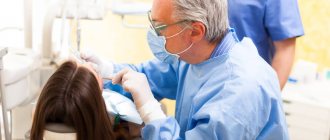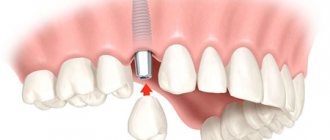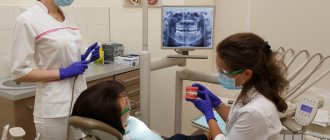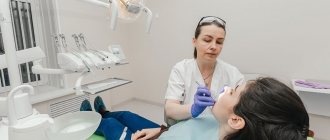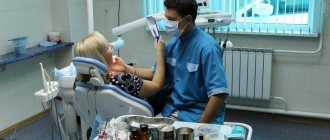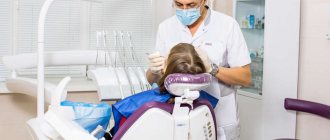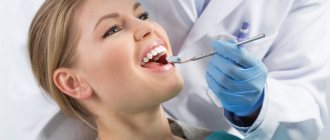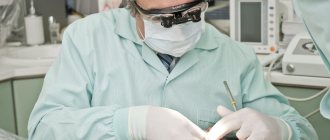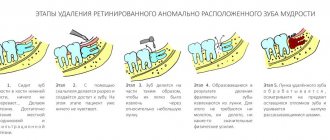Surgical dentistry is one of the branches of dentistry that specializes in bone grafting and surgical removal/preparation/implantation of teeth. Additionally, practicing specialists engage in aesthetic surgeries in periodontology. For example, eliminating gum recession, lengthening the crown of the tooth, etc. What do you need to know about dental surgeons, what symptoms should you visit a doctor for, and what to expect from therapy?
In what cases should I contact
As planned
A visit to a dental surgeon is mandatory for children from 1 to 3 years old. During this time, it is necessary to carry out from one to several examinations by a specialist in this profile. The doctor should first examine the child at 1 year of age. By this age, approximately 8 baby teeth have already grown, the rest are in the process of erupting. The doctor checks them for the presence of caries, inflammatory diseases, assesses the sensitivity of the enamel, and checks their correct location. At this time, bite pathologies can be detected in time.
Routine examinations are also indicated for patients with neoplasms in the maxillofacial area, as well as for persons who have previously undergone surgery. In this case, the doctor observes the pathology for progression or degeneration when it comes to benign tumors, fistulas, keloid scars, etc.
Unscheduled
Unscheduled assistance from a dental surgeon may be needed in many cases. It is necessary for a number of diseases and medical problems. Here is a list of the main ones:
- Removal of teeth and administration of anesthesia . A dental surgeon can remove damaged and diseased teeth, as well as administer anesthesia (infiltration and conduction).
- Placement of dental implants . A dental surgeon can help with dental implants. He works on bone reconstruction in the areas where implants will be placed. If necessary or desired by the patient, the dental surgeon can also modify the gum tissue around the implants to create a more natural and attractive appearance.
- Treatment of facial injuries . Dental surgeons can treat small and complex lacerations on the face, restore broken jaws and facial bones, and nerve endings. Their expertise includes facial injuries that involve the tissues of the mouth, jaw, cheeks, nose, eye sockets and forehead.
- Assessment of pathological conditions . Oral surgeons treat patients with benign cysts and tumors of the mouth and face, malignant neoplasms, and severe infections of the mouth, salivary glands, jaws and neck.
- Elimination of pain syndrome . A dental surgeon can diagnose and treat facial pain that is caused by temporomandibular joint (TMJ) problems.
- Reconstructive and cosmetic surgery . A dental surgeon can correct problems with the jaw, facial bone and soft tissues of the face that have arisen as a result of injury or removal of tumors. Such corrective surgeries restore the shape and function of the maxillofacial area.
- Correction of birth defects . Oral surgeons also surgically correct congenital defects of the face and skull, such as cleft lip or cleft palate.
Tags
Dental laboratory dental restoration. Tooth extraction Dental treatment and Dental implantation Dental prosthetics tooth extraction tooth whitening Placement of dental implants Wisdom teeth Dental prosthetics Removable prosthetics in prosthetics or prosthetics required in the treatment and Treatment of pulpitis Treatment of periodontitis Dental treatment Treatment methods Treatment of injuries diseases treatment of the patient Treatment methods treatment method depends on the treatment of teeth
crownsimplantsarticleschildrenthanprostheticsrestorationbonecleaningquestionwhiteningpromotionsrestorationveneersremoveinstallationourhomemore detailsisorthodontistmoscowbestsaveorthodonticceramichealthvolumehygieneoptionsnearest
What diseases does it treat?
Among the main diseases treated by a dental surgeon:
- periodontitis;
- diseases of the TMJ (temporomandibular joint);
- periostitis;
- osteomyelitis;
- tumors and cysts of the oral cavity;
- diseases of the salivary glands;
- sinusitis;
- abscesses;
- trigeminal nerve diseases;
- phlegmon and others.
A doctor of this profile also diagnoses some specific systemic diseases that manifest themselves in the oral cavity. Among them: syphilis, actinomycosis, scurvy, tuberculosis, etc. For such diseases, treatment is prescribed to the patient by another doctor (infectious disease specialist, virologist, pulmonologist).
Responsibilities of the surgeon
To perform operations, it is not enough to obtain a higher education in the specialty “Dentistry”. Additionally, you should undergo retraining or residency in the specialty “Surgical Dentistry”. But theoretical knowledge is not always enough. The best dental surgeon must be able to reassure the patient and set him up morally for a positive outcome of the surgical intervention. Long-term practice and a large number of positive reviews indicate high qualifications.
The job description of a dental surgeon is the main document that should guide a specialist when performing his duties. A qualified dental surgeon must:
- comply with safety precautions and labor protection rules;
- adhere to internal rules;
- timely carry out orders from the management of the medical institution;
- manage lower-level medical personnel;
- provide qualified medical care for identified diseases using modern methods of surgical treatment and diagnosis;
- draw up a patient treatment plan;
- adjust the treatment plan if necessary;
- carry out examinations of patients after surgery in the hospital.
The responsibilities of a dental surgeon are quite varied. Such a specialist not only performs surgical treatment of advanced diseases, but also monitors the work of nurses, monitors the patient’s condition, and maintains working documentation.
Preparing for your appointment
Before going to the dentist, you need to have a hearty snack - after surgical procedures, you should not eat food for several hours. On the eve of the visit, drinking alcohol is contraindicated - it can negatively affect the effect of anesthetics (painkillers will not work). Immediately before visiting a doctor, you need to perform thorough oral hygiene.
Patients who have encountered acute infectious diseases of the ENT organs, rashes in the oral cavity, or herpes on the lips should avoid visiting a specialist. Women are not recommended to undergo surgical procedures on menstruation days, since at this time the body is in a weakened state.
You must bring your medical history, reports from previous examinations, and all x-rays (if available) with you to your appointment.
Periodontal surgery
Periodontal surgery is one of the areas of dental surgery, which is based on operations on periodontal tissues. Such operations include:
- Covering recessions with gum flaps.
- Frenuloplasty – plastic surgery of the frenulum of the lips and tongue.
- Vestibuloplasty is surgery in the area of the vestibule of the oral cavity.
- Curettage of gum pockets.
- Use of various membranes for targeted tissue regeneration.
Such operations are started according to strict indications after a thorough diagnosis.
How is the appointment going?
Like any other specialist, a dental surgeon first of all listens to patients’ complaints and collects anamnesis. He must know everything related to the problem that worries the patient. Then it’s time for a visual inspection. The doctor examines the problem area, and he can use tools such as a dental mirror, spatula, probe and others.
Using light tapping, the doctor identifies the area that is causing pain. If we are talking about soft tissues, palpation is performed. The doctor pays attention to swelling, redness, altered areas of the skin and mucous membranes, as well as the patient’s appearance. How the examination will be carried out directly depends on the specific case.
Diagnostic methods
In surgical dentistry, instrumental and laboratory diagnostic methods are used. These include:
- taking anamnesis;
- visual and manual inspection;
- temperature diagnostics;
- X-ray examination (x-ray and orthopantomogram);
- electroodontic diagnostics;
- general blood test, etc.
If oncological processes are suspected, the patient is prescribed a biopsy and a series of cytological studies. With their help, you can determine the type of neoplasm, as well as confirm or refute its benignity.
If there are concomitant diseases that are not within the competence of the dental surgeon, the patient may need the help of other specialists. In particular:
- orthodontist;
- orthopedist;
- gastroenterologist;
- oncologist;
- infectious disease specialist;
- allergist, etc.
Make an appointment
Center for Aesthetic Dentistry
Center for Aesthetic Dentistry (m. Universitet, Prospekt Vernadskogo, 11/19) Center for Dental Implantology (metro Krasnye Vorota, Sadovaya-Spasskaya St., 19) Center for Dental Implantology (m. Paveletskaya/m. Novokuznetskaya, Ozerkovskaya embankment , no. 26) Center for Aesthetic Dentistry on Chistye Prudy (metro Chistye Prudy, Maly Kharitonyevsky Lane, no. 8/18) Clinic DentalGeneva (Boulevard James-Fazy 4, 1201 Geneva) Clinic "Aesthetic Dentistry" on Patriarch's Ponds ()
By clicking the “Submit” button, I agree to the processing of my personal data in accordance with the Privacy Policy
Close
Treatment methods
Surgical dentistry provides a wide range of treatments, which include special methods of surgical influence on the tissues of the oral cavity. The specific choice of treatment method depends on the disease. This section of dentistry practices the following treatment methods:
- bone grafting;
- tooth extraction operations;
- aesthetic surgical operations;
- implantation;
- prosthetics;
- resection of soft tissues.
After surgery, anti-inflammatory, antihistamine, antiprotozoal and antibacterial drugs may be prescribed. If pain is present, anesthetics are indicated.
Interaction with other specialties
© Robert Kneschke/Fotolia
The specialty of a dental surgeon involves close interaction with doctors from all areas of dentistry. The surgeon can remove teeth only after the therapist confirms the impossibility of saving them .
Extraction cannot be carried out without the testimony of an orthodontist, who monitors the correct development of the bite and dentition. The work of an orthopedist also cannot do without the participation of a surgeon, since in order to install dentures, it is necessary to remove all roots and bad teeth.
If you find an error, please select a piece of text and press Ctrl+Enter.
Tags: implantation, tooth removal
Did you like the article? stay tuned
Previous article
Orthopedic dentist: what does this specialist do and what does he treat?
Next article
Dental prosthetics without turning: types, advantages, prices
